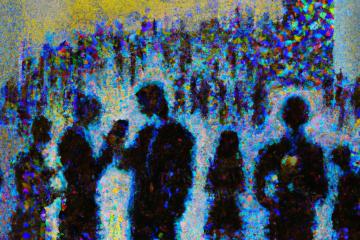Though he always expected artificial intelligence to make waves in his field of digital humanities, Johns Hopkins assistant research professor Tom Lippincott said he was caught off guard by how quickly it happened.
Gearing up recently for a class teaching computational skills to humanists, Lippincott said, he was prepared to "go into my usual spiel" about the broad but limited abilities of machine learning. Then came the debut of ChatGPT, the revolutionary new humanlike language-processing tool. "So I was rewriting my first introductory lectures to say … maybe this is a bit of a threat—or an opportunity."
Both edges of that sword were the topic of conversation Thursday for a group of Johns Hopkins experts—moderators Tinglong Dai (Carey Business School) and Peter Lawson (Sheridan Libraries), along with Lippincott, Jenna Frye (Center for Leadership Education), and Jared Kaplan (Krieger School of Arts and Sciences). Also joining was Christian Terwiesch from the Wharton School at the University of Pennsylvania.
The virtual event, ChatGPT, AI, and the Future of Higher Education, was hosted by the Johns Hopkins Institute of Data Intensive Engineering and Science (IDIES) as part of International Love Data Week 2023.
Terwiesch, co-author of the popular MBA textbook Matching Supply with Demand, shared the viral story of ChatGPT competently passing one of his exams at Wharton, excelling at some answers and faltering with other, more complex ones. "All in all, I would have given this thing a B or a B-," he said.
The most immediate value Terwiesch sees in ChatGPT is "as a stimulus for brainstorming." For example, if students task the tech to come up with five ideas in digital health care, "in the worst-case scenario, you're going to get five OK ideas," he said. "But even better, [if] you feel like well, those ideas suck, I can do better than that—now you've started jumping into the water, and you've started being creative, right?"
Also see
Within the next year or two in education, expect to see "specialized models that are kind of like tutors that you ask … about different areas, and they engage with you in an interesting way," said Kaplan, a Hopkins theoretical physicist who helped develop Claude, the ChatGPT-like tool that just scored $300 million from Google.
"I like that this is sort of an inflection point toward improving the student experience rather than just a crisis," said Lawson, librarian for data and visualization at the Sheridan Libraries.
Along with the promise of the technology, the experts pointed to potential challenges in plagiarism, citations, inherent biases, and other ethical concerns.
"What it brings up most for me is thinking about how important information literacy is going to be as a foundational educational concept in all fields," Frye said, "because the success of any of this in class depends on the student's ability to know when to believe it, and when not to believe it. So I think there's a lot at stake there."
It also opens deeper questions, Frye said. If a student hands in a paper based on a ChatGPT answer, maybe their lack of motivation is the real problem. "And to me, that seems like a bigger crisis than that they used a chatbot to solve it. Why aren't you interested? What's in the way of that? And how do we get you to be more interested in your education?"
Beyond education, ChatGPT presents "uncharted territory" in terms of its broader impacts on society, Kaplan said. "This is just the tip of the iceberg," he said. "ChatGPT is just the thing we have this year. But next year and the year after, we're going to have something much, much, more powerful."
"You can be very excited or very scared," Kaplan added. "I feel a mixture of both."
Posted in Science+Technology, Voices+Opinion, Politics+Society
Tagged artificial intelligence, higher education, idies









